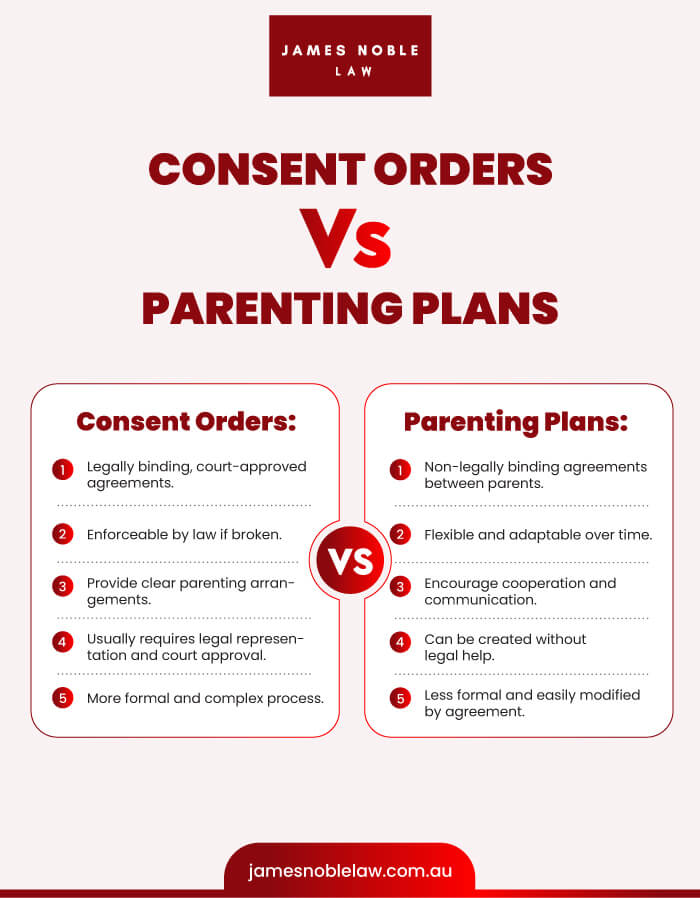Marriage is often seen as the ultimate romantic commitment, a beautiful union of two people who share not only love but also hopes, dreams, and…

Table of Contents
Key Areas Surrounding Child Custody

Separation and divorce can often be the most traumatic and difficult times for any adult. However, it can be particularly difficult when there are child/ren involved.
In these circumstances, the Federal Circuit and Family Court of Australia (the “Court”) considers the best interests of the child to be paramount.
Importantly, your child/ren have the right to spend time and have a meaningful relationship with both parents. It is important to consider what the law says about parenting arrangements and how your separation may impact your child/ren.
You should always be fully aware of your legal rights and the rights of the child/ren involved. We can offer accurate advice regarding your child/ren’s right to spend time with you and help you achieve the best outcome for your child or children.
At James Noble Law, we prioritise the well-being of children. We can support you during this challenging and emotional time, providing counselling and psychological assistance if needed through our network of trusted professionals.
If you are going through a separation, it is important to obtain comprehensive information about parenting arrangements, your rights, and obligations.
To explain some of the key areas surrounding child custody, let’s unpack some of the commonly used phrases and meanings such as ‘equal shared parental responsibility, ‘significant and substantial time’, and ‘major long-term decisions’.
You will need to understand these concepts to protect your legal rights. If it is necessary, we will take steps to obtain legal protection in situations involving family violence.
Equal shared parental responsibility

A common type of parenting order made by the Federal Circuit and Family Court of Australia is to give the parents equal shared parental responsibility.
This means that parental responsibility is shared equally between both parents, and that one parent is must not make any major long-term decisions for the child/ren without communicating with the other.
Major long-term decisions include, but are not limited to the following:
- Education (both current and future needs);
- Religious and cultural upbringing (this is particular a sensitive issue when parents are either of different denominations or ethnic cultures);
- Health (which includes decisions such as whether to vaccinate, immunise or conduct other medical procedures);
- Changing the child/ren’s name; and
- Living arrangements which would significantly impose difficulty for one parent to spend time with the child/ren (where one parent wishes to move interstate, or even further domestically).
Sole parental responsibility

If a parenting order is made by the Federal Circuit and Family Court of Australia for a party to have sole parental responsibility, that party does not need to consult the other parent in the decision-making process for major long-term decisions.
What is the difference between equal shared parental responsibility and day to day responsibility?
Equal shared parental responsibility refers to both parents having an equal say in major decisions affecting their child/ren’s life, such as education, health, and religion. It emphasises the importance of both parents being involved in these significant aspects of their child/ren’s upbringing.
On the other hand, day-to-day responsibility involves the daily care and decision-making involved in raising a child, such as meal preparation, bedtime routines, and discipline while your child/ren are spending time with you.
While both parents may share day-to-day responsibilities, equal shared parental responsibility specifically pertains to the more significant, long-term decisions that impact the child’s overall well-being and future.
For instance, one parent is not required to consult the other regarding the best route to drop the child/ren of at school, what the child/ren eat or what the child/ren’s routine will be, as these are not considered major long-term issues.
Not only does this allow parents to have small freedoms in relation to the raising of their child/ren, but it also prevents the parents from over-communicating, particularly where the parties have recently been involved in Court proceedings.
Consequences of not consulting on major long-term decisions

If the Court does order the parties have equal shared responsibility and a parent relating to that order fails to make a genuine effort to involve the other with the major long-term issues of the child/ren, that parent may be in breach (contravention) of the parenting order.
Despite one parent’s feeling towards the other, if Court Orders are in place and provide for equal shared parenting responsibilities, it is crucial that both parents abide by these orders.
The law regarding arrangements for children is complex. Even if relations with your former partner are amicable, it is advisable to obtain legal advice, so you can fully understand your rights, obligations and liabilities regarding legal considerations which apply to the specific parenting arrangements in your matter.
What can we do for you across the range of parenting matters?
We can assist you across a range of parenting matters, including, but not limited to:
- Relocation;
- Child Support Payments;
- Accessing Family Dispute Resolution and Section 60I Certificates;
- Living, Travel and Holiday arrangements for children;
- Time spent with extended family members;
- Parenting arrangements; and
- Grandparents rights.
Our main goal is to help you reach an agreement with the other party through negotiation or mediation, which we will assist and support you in. If an agreement cannot be reached, we will suggest and pursue litigation or arbitration based on your instructions.
Even if we initiate court proceedings, we will strive to resolve your case amicably rather than
seeing it through to a final court decision.
Consent Orders vs. Parenting Plans

Importantly, if an agreement can be negotiated between the parties without the involvement of litigation or court proceedings, that agreement should be contained in a legally binding document such as Consent Orders. For more information on Consent Orders, see our blog posts by clicking here.
Alternatively, you may seek to have the agreement provided for under a Parenting Plan, however, it is important that you understand that this agreement will not be filed with the Federal Circuit and Family Court of Australia and is therefore unenforceable at law.
A Parenting Plan approach may be appropriate in circumstances where the relationship with your former partner is amicable, or, you and your former partner wish to maintain flexible arrangements for your child/ren in the future.
We can assist you during this process by:
- Negotiating terms of parenting arrangements with your former partner;
- Representing your position and best interests at mediations which may be held with your former partner;
- Preparing a Parenting Plan or Consent Orders where you have reached an agreement with your former partner; and/or
- Preparing Court documents and representing you in litigation where an agreement is unable to be reached with your former partner.
Since each family is unique, and the best interests of the child often differ from case to case, there is no one set of uniform arrangements provided for under the Family Law Act 1975 (Cth).
Instead, the Federal Circuit and Family Court of Australia actively encourages parents to reach agreements regarding parenting arrangements for their child/ren outside of court, provided the outcome represents the best interests of the child/ren. If it becomes necessary for the matter to progress to Court, the Court must have that same regard when determining what Orders it will make with respect to care arrangements for the child/ren.
Best interests of the child/ren

When determining child custody arrangements, the Court will account for the primary consideration of the child’s best interests which include, but are not limited to:
- The benefit of the child having a meaningful relationship with both parents;
- The importance for child spending time with and communicating with both parents on a regular basis; and
- The need to protect the child from physical or psychological harm or exposure to abuse, neglect or family violence.
In addition to the primary considerations listed above, the Court will also examine secondary considerations pursuant to legislation,
Which include:
- The child’s age;
- Any views expressed by the child;
- What weight should be given to those views (such as the child’s maturity or level of understanding);
- The child’s relationship with each parent (including other persons such as grandparents);

Court’s Secondary Considerations pursuant to legislation of the child’s best interests The likely effect of changes to the child’s circumstances, including separation from either parent or from any other child residing with them;
- The practical difficulty and expense of a child spending time with and communicating with a parent;
- The capacity of each parent to provide for the child’s emotional, intellectual, and other needs;
- The maturity, sex, lifestyle, and background of the child and parents;
- Each parent’s demonstrated attitude to the child and to responsibilities of parenthood;
- Any family violence involving the child or a member of the child’s family; and
- Any family violence order applies to the child or a member of the child’s family.
Before imposing an order, the Court will always consider what parenting arrangements are in the best interests of the child. During this process, the Court will place appropriate weight to the child’s views depending upon various factors such as the child’s maturity and understanding of the situation.
As children of a mature age are more likely to grasp the concepts of separation, split child custody, and parenting arrangements, the Court is likely to place far more weight to the views of children between the age bracket of 14 – 18 years.
Studies indicate children within this age bracket are more likely to comprehend complex situations such as parenting arrangements as opposed to children less than 10 years.
However, it is important to note that the Court will use its discretion when determining how much weight to place on the views of the child.
Independent evidence and Expert reports
The Court will also give weight to any independent evidence available in the matter such as a Family Report or other expert report. For more information on Family Reports, see our blog posts by clicking here.
To prevent parents from unduly influencing their child/ren through manipulation or bribery, it is important to involve expert third parties. These professionals, such as Family Report Writers, Independent Children’s Lawyers, Psychologists, or Counsellors, can help the Court understand your child/ren’s true views.
This involvement serves as a safeguard against parenting orders being swayed by distorted or manipulated views, ensuring that the child/ren’s best interests are protected.
Family Reports and input from experts play a crucial role in custody and parenting disputes. Family Report Writers, for example, provide an impartial assessment of the family dynamics and the child/ren’s relationship with each parent.
They interview family members, observe interactions, and may recommend parenting arrangements based on their findings. Independent Children’s Lawyers represent the child/ren’s best interests in court, ensuring their views are heard and considered.
Psychologists and counsellors can offer valuable insights into the child/ren’s emotional well-being and help devise strategies for effective co-parenting. Involving these experts helps the court make informed decisions that prioritise your child/ren’s best interests.
Child Relocation

When parents are multinational and have significant ties or family members in another country, it is important to prioritise the child/ren remaining in the Australian Commonwealth jurisdiction until Parenting Plans, Consent Orders, or Parenting Orders are finalised.
According to Australian law, the Federal Circuit and Family Court of Australia does not permit one parent to relocate their child/ren interstate or overseas without the other parent’s consent. If a parent tries to do so, there are several measures that can be taken to prevent it.
Common methods include surrendering passports to the Court, restraining that parent from having the passports in their possession unless agreed, or seeking orders that prevent the child/ren’s removal from Australia, which can involve requesting assistance from the Australian Federal Police and having the child/ren placed on the Airport Watch.
Where the children should live in the event of a partnership separation?
In cases where child/ren are born overseas to a couple and the partnership ends, there are no strict rules dictating where the child/ren should reside.
For example, in the high-profile 2017 case of Melissa George, it was illustrated how international relationships can deteriorate rapidly. In George’s case, the children were born in France to a French father, giving them French citizenship. Consequently, Melissa was unable to receive court approval to remove the children from France.
Another well-known case involves Sally Faulkner and the Channel 9 TV Crew in 2016. Following a televised kidnapping attempt by Faulkner, her husband relocated both children to Lebanon, where a Lebanese judge awarded him full custody. This case serves as a stark reminder to avoid taking matters into your own hands, regardless of the circumstances. The Federal Circuit and Family Court of Australia takes any attempt by a parent to purposefully remove, abduct, or kidnap a child from the other parent very seriously. Such actions can lead to significant fines or orders restricting that parent’s contact with the child/ren.
If your child/ren has been taken out of Australia without your consent or has not been returned, you should immediately contact the Commonwealth Attorney-General’s Department for assistance. While Australia has agreements with some countries to return abducted children under the Convention on the Civil Aspects of International Child Abduction, enforcement is not possible if the country is not a party to this convention. For more information on the Hague Convention, see our blog posts by clicking here.
In the event of an out-of-hours emergency related to child abduction, contact the Court on to make an urgent application. If you suspect an abduction may occur soon but it has not yet happened, you should seek legal advice or contact the Australian Passport Information Service on 13 12 32 to inquire about child alerts.
How much does a Child Custody Lawyer cost in Australia?

The cost of hiring a custody lawyer in Australia can vary widely depending on the complexity of the case, the experience of the lawyer, and the region.
In Brisbane, hourly rates for family lawyers generally range from AUD 300 to AUD 600. Some lawyers may offer fixed fees for certain services. Initial consultations often cost between AUD 200 to AUD 400.
Additionally, more complex cases that go to trial can end up costing anywhere from AUD 10,000 to AUD 50,000 or more.
How often do fathers get 50/50 custody in Australia?
In Australia, the Family Law Act 1975 emphasizes the importance of children having a meaningful relationship with both parents, provided it is in the child’s best interests.
While 50/50 custody is not guaranteed, shared custody arrangements, including equal shared parental responsibility, are common if they are deemed to benefit the child’s welfare.
The actual time split depends on various factors, including the parents’ ability to cooperate and the child’s needs. Studies suggest that around 15-20% of cases result in a near-equal time arrangement.
At what age can a child choose which parent to live with in Queensland?
In Queensland, as in the rest of Australia, there is no specific age at which a child can definitively choose which parent to live with.
However, the court considers the child’s wishes as one of many factors when determining custody arrangements.
Typically, the views of children over the age of 12 are given more weight, but the court ultimately decides based on the child’s best interests, regardless of age.
Can a father take custody from mother in Australia?
Yes, a father can be awarded custody of a child in Australia. The Family Law Act 1975 does not favor one parent over the other based on gender.
Custody decisions are made based on what is in the best interests of the child, considering factors such as the child’s relationship with each parent, the ability of each parent to provide for the child’s needs, and any history of family violence.
If a father can demonstrate that living with him would be in the child’s best interests, he can obtain custody.
How many times a week or month should a father see his child?
There is no one-size-fits-all answer to how many times a week a dad should see his child, as it depends on the custody arrangement agreed upon by the parents or ordered by the court.
Common arrangements may include alternate weekends, one or two midweek visits, and shared holidays.
The goal is to ensure that the child maintains a meaningful relationship with both parents, provided it is safe and in the child’s best interests.
Who is more likely to get custody of a child in Australia?
In Australia, neither parent is automatically more likely to get custody based on gender. The Family Law Act 1975 requires that custody decisions be made based on the best interests of the child.
This involves evaluating various factors, including each parent’s relationship with the child, the child’s wishes, the ability of each parent to provide for the child’s needs, and any history of family violence.
Historically, mothers have been more likely to be primary caregivers, but there is an increasing trend towards shared custody and equal parental responsibility when appropriate.
Here at James Noble Law, we offer 24/7 support and can assist you after hours.
Seeking legal support?
Look no further than James Noble Law! We are your trusted Family Law experts, boasting more than 50 years of experience, and extending our Family Law services to Brisbane, Family law in Cairns, and in Milton. Take advantage of a complimentary 20-minute consultation with our highly skilled legal team – no obligations required! Secure your appointment now to connect with our seasoned Family Lawyers.
Explore:
🌟 Accomplished Brisbane Family Lawyers
🌟 Devoted Cairns Family Lawyers
🌟 Proficient Milton Family Lawyers.
Easily find us on Google Maps and take the proactive step towards resolving your legal matters. Seize this opportunity for guidance from our professionals with over 50 years of experience. Act today and pave the way for legal clarity and confidence!
You may also like to know more information about the
- Mother withholding child from father Australia.
- Parental Responsibilities and Legislation.
- The different types of Child Support Arrangements.
- Parenting PlanAbout Future Care Arrangements for your Children.
- Spousal maintenance qld, Brisbane, Australia.
- Learn about the family court portal.
- Get connected with Brisbane family lawyers.
NEED HELP?
TALK TO A NOBLE FAMILY LAWYER
FAMILY LAW NEWS
Keep up to date and receive clarity on a range of news related articles on the James Noble Law blog.


By James Noble Law, Queensland Family Law Experts When it comes to parenting arrangements after separation or divorce, one of the most common questions we…

When entering a relationship or going through a separation, financial security and clarity are paramount. That’s where a Binding Financial Agreement (BFA) may be advisable.…




